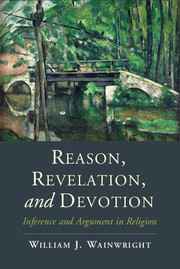Book contents
- Frontmatter
- Dedication
- Contents
- Acknowledgments
- Introduction
- 1 Four Examples of Religious Reasoning
- 2 The Purposes of Argument and the Person-Relativity of Proofs
- 3 Religious Reading and Theological Argument
- 4 Passional Reasoning
- 5 The Role of Rhetoric in Religious Argumentation
- 6 Reason, Revelation, and Religious Argumentation
- 7 Theology and Mystery
- Conclusion
- Notes
- Index
7 - Theology and Mystery
Published online by Cambridge University Press: 05 December 2015
- Frontmatter
- Dedication
- Contents
- Acknowledgments
- Introduction
- 1 Four Examples of Religious Reasoning
- 2 The Purposes of Argument and the Person-Relativity of Proofs
- 3 Religious Reading and Theological Argument
- 4 Passional Reasoning
- 5 The Role of Rhetoric in Religious Argumentation
- 6 Reason, Revelation, and Religious Argumentation
- 7 Theology and Mystery
- Conclusion
- Notes
- Index
Summary
Christianity's critics have often accused it of mystery mongering. Hume, for example, says that “all popular theology, especially the scholastic, has a kind of appetite for absurdity and contradiction. If that theology went not beyond reason and common sense, her doctrines would appear too easy and familiar. Amazement must of necessity be raised: Mystery affected: Darkness and obscurity sought after: And a foundation of merit afforded to the devout votaries, who desire an opportunity of subduing their rebellious reason, by the belief of the most unintelligible sophisms.” And John Toland asserts that Christian theologians and priests have gone even further than the heirophants of the ancient mystery cults. The latter swore their initiates to secrecy but their mysteries were intelligible in themselves. Only Christians dared maintain that their doctrines were mysterious in a more radical sense, “that is, inconceivable in themselves, however clearly revealed.”
Hume's and Toland's explanations of this phenomenon differ. But whatever one thinks of their explanations, there is little doubt that the appeal to, and adoration of, mystery is a characteristic feature of much Christian thought and practice. The Pseudo-Dionysius, for example, begins his Mystical Theology by asking the Trinity to guide him to the “most exalted” and hidden secrets of scripture “which exceedeth light and more than exceedeth knowledge, where … the mysteries of heavenly truth lie hidden in the dazzling obscurity of the secret silence, outshining all brilliance with the intensity of their darkness,” and exhorts his disciple “to leave the senses and the activities of the intellect” and their objects behind, and “strain … toward him whom neither being nor understanding can contain.”
Nor are themes like these peculiar to Christian mystics and mystical theologians. They are commonplace in the church fathers and in a number of later Christian theologians. Two examples will suffice to illustrate my point. Consider first John Chrysostom. St. Paul said:
“The Lord … dwells in unapproachable light.” And pay heed to the accuracy with which Paul speaks…. He does not say: “Who dwells in incomprehensible light,” but: “in unapproachable light,” and this is much stronger than “incomprehensible.” A thing is said to be “incomprehensible” when those who seek after it fail to comprehend it, even after they have searched and sought to understand it, but does not elude all inquiry and questioning.
- Type
- Chapter
- Information
- Reason, Revelation, and DevotionInference and Argument in Religion, pp. 129 - 147Publisher: Cambridge University PressPrint publication year: 2015

